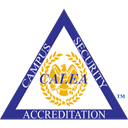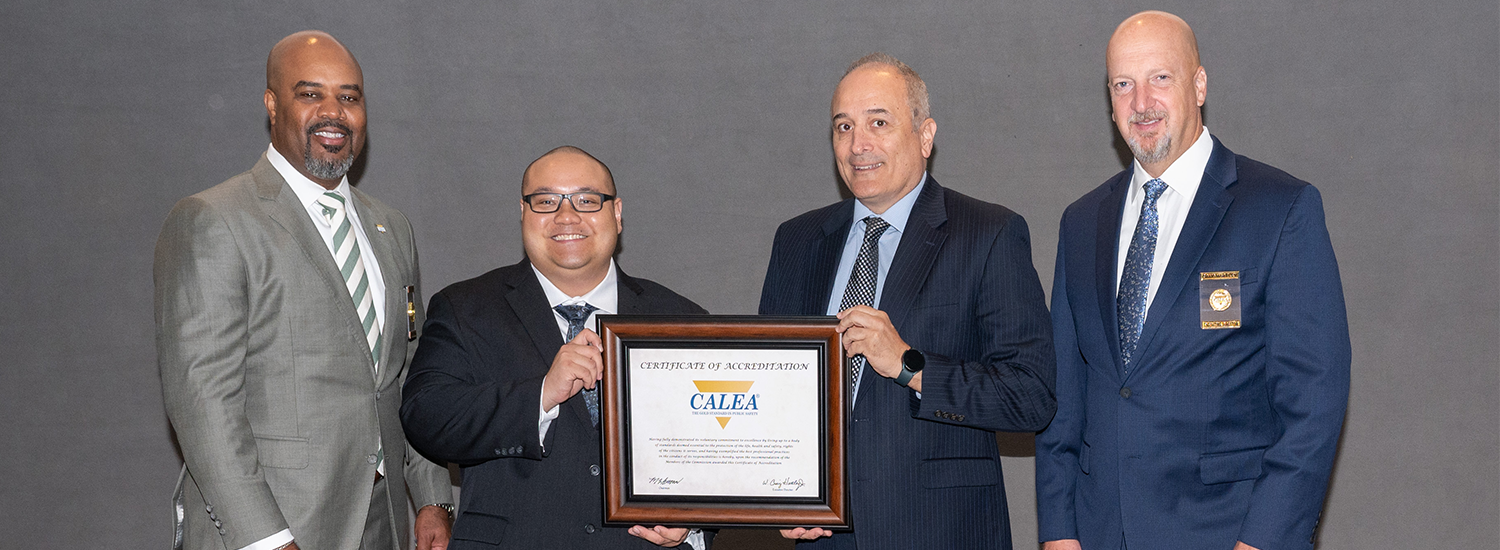

University of Hawaiʻi at Mānoa Department of Public Safety was awarded national Campus Security Accreditation in May 2019 and achieved re-accreditation in July 2023.
Commission on Accreditation for Law Enforcement Agencies, Inc. (CALEA®)
The Commission on Accreditation for Law Enforcement Agencies, Inc. (CALEA®), was created in 1979 as a credentialing authority through the joint efforts of law enforcement’s major executive associations. The CALEA Accreditation Program seals are reserved for use by those public safety agencies that have demonstrated compliance with CALEA standards and have been awarded CALEA accreditation by the commission.
What is accreditation?
The CALEA Accreditation Program provides public safety agencies with an opportunity to voluntarily meet an established set of professional standards, which require:
- Comprehensive and uniform written directives that clearly define authority, performance, and responsibilities
- Reports and analyses to make fact-based and informed management decisions
- Preparedness to address natural or man-made critical incidents
- Community relationship-building and maintenance
- Independent review by subject matter experts
- Continuous pursuit of excellence through annual reviews and other assessment measures
Accreditation serves to recognize and maintain professional excellence in DPS security services by demonstrating compliance with national standards and best practices. Similar to schools, hospitals, and other industries, accreditation status for law enforcement agencies provides a framework for department-wide commitment to excellence.
Benefits of accreditation
- Greater accountability within the agency: CALEA standards give the DPS a proven management system of written directives, sound training, clearly defined lines of authority, and routine reports that support decision-making and resource allocation.
- Increased community advocacy: Accreditation embodies the precepts of community-oriented policing. It creates a forum in which agencies and citizens work together to prevent and control challenges confronting law enforcement and provides clear direction about community expectations.
- Staunch support from government officials: Accreditation provides objective evidence of an agency’s commitment to excellence in leadership, resource management, and service-delivery. Thus, government officials are more confident in the agency’s ability to operate efficiently and meet community needs.
- Stronger defense against civil lawsuits: Accredited agencies are better able to defend themselves against civil lawsuits. Also, many agencies report a decline in legal actions against them, once they become accredited.
- Reduced risk and liability exposure: Many agencies report a reduction in their liability insurance costs and/or reimbursement of accreditation fees.
What does the accreditation process involve?
The accreditation process consists of the following phases:
- Application
- Self-assessment
- On-site assessment
- Commission review
- Maintaining compliance of standards for reaccreditation
In order to achieve accredited status, DPS must comply with 293 standards, and maintain continued compliance in order to keep this status. Accreditation lasts four years, during which time the agency must submit annual reports and participate in annual web-based assessments attesting continued compliance with those standards under which it was initially accredited. Reaccreditation occurs at the end of the four years, pending another successful on-site assessment and hearing before the Commission.
The CALEA accreditation process involved more than three years of policy development and training, to align the department with industry best practices. The program focuses on the safety and security of students and employees, and applies standards that require organizations to consider critical issues such as facility risks, regulatory reporting, technology-based security monitoring, preventative patrol and a host of other issues that provide comprehensive service delivery. These concepts are centered on the community-oriented policing model, which seeks to involve the community in crime prevention and education.
DPS Public Comment Portal
The University of Hawaiʻi at Mānoa Department of Public Safety is participating in the CALEA Campus Security Accreditation process. As a part of this process, we provide an opportunity for public feedback via the CALEA portal which can be located here: https://cimrs2.calea.org/629
The purpose of this public portal is to receive comments regarding our compliance with CALEA standards, engagement in the service community, delivery of public safety services, and overall candidacy for accredited status. These comments can be in the form of commendations or concerns. The overall intent of the accreditation process is to provide our agency with information to support continuous improvement, as well as foster our pursuit of professional excellence.
It is important to know that CALEA is not an investigatory body and subsequently the public portal should not be used to submit information for such purposes. Additionally, there will be no response other than acknowledgement to submissions; however, the information will be considered in context to its relevancy to compliance with standards and the tenets of CALEA® Accreditation.
Standard titles may be viewed on the CALEA website: Campus Security – Standards Titles | CALEA® | The Commission on Accreditation for Law Enforcement Agencies, Inc. The level of accreditation the UHM Department of Public Safety is participating in includes all 293 standards listed.
For more information about the accreditation process, please contact the DPS Professional Standards Manager at (808) 956-6581.
More information:
For more information about the accreditation process, contact the DPS Professional Standards Manager at (808) 956-6581 or The Commission on Accreditation for Law Enforcement Agencies, Inc. at (703) 352-4225.

